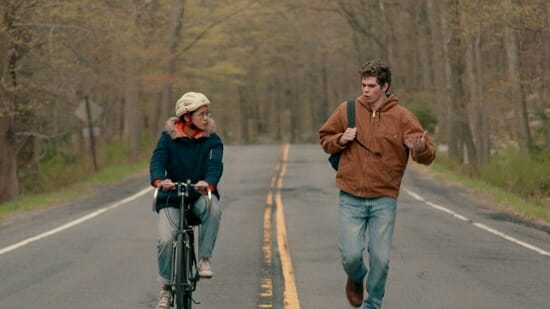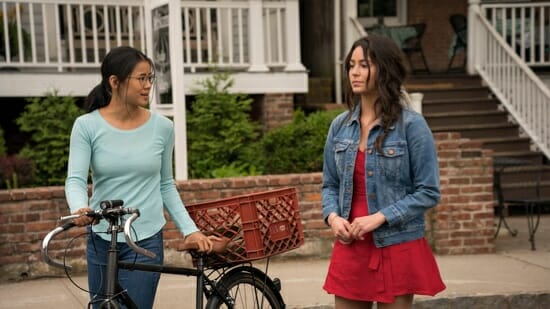
Netflix’s The Half of It begins somewhat deceptively, with a highly stylized animated retelling of an old Greek myth in which the four-armed, four-legged, two-headed humans of ancient times are sundered by the gods and wander about forever in search of the other half of their single heart. It ends with a scene between a boy and a girl, something that normally would come right out of a dopey rom-com, but in a way that subverts the trope on every level, from the inversion of its meaning to the quiet, intimate naturalism with which it is filmed. It’s a fitting juxtaposition because the film sandwiched between the two moments is about the fallacies that drive our neat and tidy narratives about love.
Love is messy is the point, one called out aloud by main character Ellie Chu (Leah Lewis) in Alice Wu’s short little film about a Chinese-American high schooler whose incredible writing skills find her hired to help her classmate, the kindhearted but far less charming Paul (Daniel Diemer), woo another girl. Paul does not realize that Ellie shares his unrequited desire for Aster (Alexxis Lemire), and that every sweet late-night text and smoldering note passed in class is tearing Ellie apart.

If the story borrows its central conceit from Cyrano de Bergerac, it at least puts a few interesting spins on it: Ellie is an outsider in unique ways. She is the only Asian student at her school, an immigrant whose underemployed and linguistically challenged father struggles to run her household. She is the student who is so good at writing that she runs a side hustle writing papers for her entire class. And then there’s the other little matter of her feeling same-sex attraction in a stiflingly small, overwhelmlingly Christian town.
Faced with her electric bill being shut off in part because her father struggles to navigate the company’s phone tree, Ellie accepts 50 bucks from Paul to start writing love letters to Aster, and it quickly becomes clear that she’s instinctively able to write everything Aster wants to hear. The viewer will of course suss out, long before Ellie or Paul does, that Aster’s disinterest in her jock boyfriend and her reticence toward Paul’s IRL advances are stemming from her own confusion and fear of her sexual orientation.
The Half of It frames that portion of the conflict tastefully but directly, as high stakes but without melodrama. Wu, whose only other feature-length writer-director credit is 2004’s Saving Face (also about a Chinese-American woman struggling with same-sex love in the face of a stifling social situation), successfully pulls off one of my favorite tricks: Making a movie about young people that convincingly shows us how big their feelings are to them without making those feelings seem ridiculous to us.

As Ellie and Paul go deeper into their scheme to win over Aster, Paul manages to land a few supremely awkward dates, but Ellie continues acting as the mouthpiece, sharing soulful late night texts and, at one point, a collaborative mural that we watch unfold in time lapse.
Along the way, Ellie and Paul grow closer as friends and come to better understand themselves as they use one another as sounding boards. Paul, deep into the family business of making sausages, yearns to make his own recipes, and Ellie is as improbably good at musical performance as she is at writing. By the end, they both put their work out for others to see, both learn to feel confident, both gradually become disabused of the notion that what they most desire is as perfect as they’ve always imagined it.
That theme—of beauty in imperfection, and of finding the confidence to reveal our true selves in our own imperfection as a prerequisite for actual, meaningful romance—even makes its way into the movie’s title cards. Parts of the film are blocked off by quotes from fusty old classics, until the end, when one of Ellie’s own quotes makes it into the rotation, after she’s finally let go of the need to hide her words behind the faces of others.

The Half of It is hobbled by a few weaknesses that feel as if they’re the result of either meddling or ruthless cuts: Ellie’s father (Collin Chou) doesn’t have enough to do and never has a single scene where he really grapples with his daughter’s sexual orientation, something that absolutely would come up. Aster gets some personal agency but never really gets to be a perspective character in a movie where her perspective is kind of important. Once Ellie makes one confident turn, she immediately becomes attractive to every single guy in the movie. Then there is, of course, the climax of the movie, where characters air their truths in public just in time to interrupt a marriage proposal that we understand spells complete disaster. I will watch Robocop levels of gore without flinching, but scenes of public embarrassment cause me to curl into a ball and peek through my fingers.
But it isn’t a rom-com without a big public confession of love. The Half of It actually manages to make its characters’ expectations in the wake of that big scene feel genuine. It also, again, vindicates my ongoing complaint about poor representation in film. Taken alongside Always Be My Maybe and To All The Boys I’ve Loved Before, The Half of It is another data point in favor of Netflix bankrolling quirky Asian-American romantic comedies. At just around an hour and a half, brought to you by a director who hasn’t made a feature-length film in 16 years, it is a unique twist on a familiar story. It is a film that universalizes feelings of otherness for the audience, whether they come from being the runt of the litter or the child of an immigrant struggling to make it in America.
And there’s the ending, the very very last scene, which I feel I should not spoil. It is not a scene between the two romantic leads of the movie, which alone should mark it for some kind of hall of fame. It nonetheless is a showing of honest love, one that is messy and silly—a slight thing that seems like the most important thing in the world.
Kenneth Lowe is a regular contributor to Paste Movies. You can follow him on Twitter and read more at his blog.